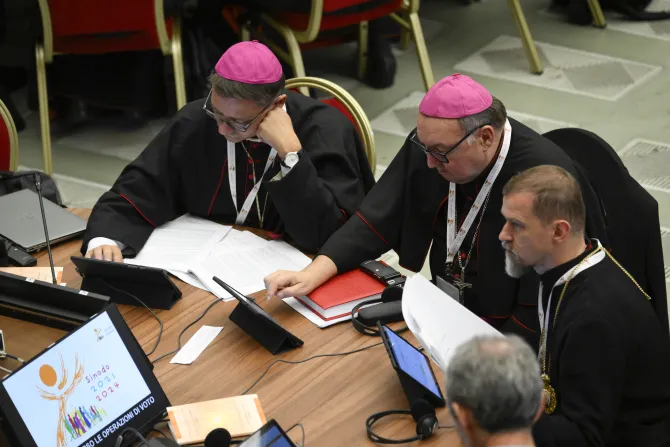Theologians conclude evaluation of synod reports after Rome meeting
By Tyler Arnold
“The reports often recount the experience of people who have made a real personal conversion,” Secretary General of the General Secretariat of the Synod Cardinal Mario Grech said in a statement following the conclusion of the theologians’ analysis.
“Others, however, are of people who continue to experience confusion, worry, or anxiety,” the cardinal continued. “In particular, there is a fear that what is sent is not taken seriously or that ideologies and lobbies of the faithful may exploit the synodal path to impose their own agenda.”
Grech said the October session will not be “about this or that issue” but focused on “synodality” and “about how to be a missionary Church on the way.” The session, he added, “will invoke the help of the Holy Spirit and that of his brothers and sisters to discern God’s will for his Church and not an opportunity to impose one’s own vision of Church.”
The group of theologians included bishops, priests, consecrated men and women, and laypeople. Eight of the theologians were European, including five Italians. There were three theologians from Africa and three from South America. Two theologians were from North America, including one from the United States; two were from Asia; and two were from Australia.
“The holy people of God has been set in motion for mission thanks to the synodal experience,” Cardinal Jean-Claude Hollerich, SJ, who is the general rapporteur of the synod, said in a statement.
“In the reports there were enthusiastic and creative responses offered as well as some with resistance and concern,” the cardinal said. “Most reports, however, show the joy of the journey that has given new life to many local communities and also provoked significant changes on their way of living and being Church. The seeds of the synodal Church are already sprouting!”
https://ceaf4bc6896fe99ac6e5f9067b2ff269.safeframe.googlesyndication.com/safeframe/1-0-40/html/container.html https://ceaf4bc6896fe99ac6e5f9067b2ff269.safeframe.googlesyndication.com/safeframe/1-0-40/html/container.html After the ordinal council evaluates the analysis from the theologians, the members will draft the Instrumentum Laboris document itself and provide the draft to Pope Francis for final approval.
Monsignor Riccardo Battocchio, the special secretary of the assembly, said in a statement that the document “will look different from the previous one,” which guided the prior synod meeting, because it will be more focused.
“If for the first session it was important to bring out the wide-ranging themes to be addressed; the working document for the October session intends instead to highlight some knots to be unraveled in order to answer the question ‘How to be a synodal Church in mission,’ taking in the path made so far and proposing theologically grounded arguments together with some concrete proposals to help the discernment entrusted to the members of the assembly,” Battocchio said.
A group of 20 theologians concluded an evaluation of 107 synod reports from national bishops’ conferences and Eastern Catholic Churches following nearly two weeks of meetings in Rome, according to a news release from the general secretariat of the synod.
The theologians, who met from June 4 through June 14, were asked to provide an analysis of the reports, which will help synod officials draft the Synod on Synodality’s “Instrumentum Laboris 2” — the document that will guide the work of the second session of the synod in October. The analysis from the theologians has not been made public.
The ongoing Synod on Synodality is focused on studying various questions about how the Church should operate. Some of the questions focus on the role of women, inclusion, women deacons, and outreach to those who struggle with same-sex attraction. Parishes held listening sessions this past Lent that were consolidated into the national reports analyzed by the theologians.
According to the news release, the themes most frequently mentioned are the formation of synodality, the functioning of participatory bodies, the role of women, outreach to young people, attention to the poor, inculturation, transparency, and a culture of accountability. Additional themes are catechesis, Christian initiation, and collaboration among churches.




